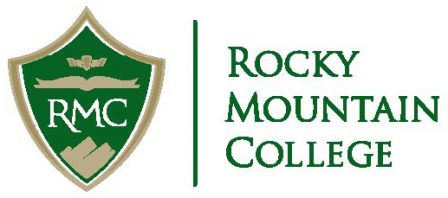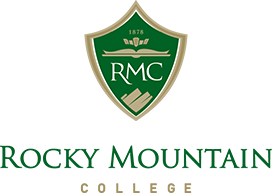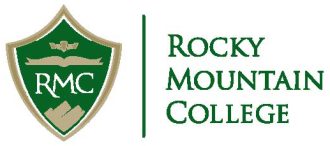Communication Studies
April 4, 2022 2024-02-26 17:58The communication studies program at Rocky Mountain College blends our strong liberal arts education with the skills every student needs to succeed in today’s world. As part of the workforce, the student majoring in communication studies will already possess the skills employers want from potential employees–oral and written communication skills. Study after study has shown that these consistently top the lists of skills employers want from their employees. As part of society, the student majoring in communication studies will learn how to be a responsible citizen of his or her community. We examine the ethical aspects of communication in our courses, reminding students that they have the responsibility to be honest, engaged citizens, in addition to succeeding in whatever career path they may choose.
Communication studies is a strong stand-alone major and is also common as a double-major or minor. The skills learned when studying communication are some of the most sought after by employers. Careers available to a communication studies major include diverse professions such as public relations, event planning, graduate school, teaching, sales, or law.
Major Learning Outcomes
Students who graduate with a major in communication studies will be able to:
- Discuss and apply communication theories;
- Articulate important features of key communication theories;
- Demonstrate the ability to support arguments and reason soundly;
- Conduct original research and present cogent results.
Major in Communication Studies
A minimum of 36 semester hours is required, including:
COM 105: Introduction to Communication Studies
COM 490: Seminar in Communication
Choose any four 200-level COM electives, for a total of 12 credit hours (excluding COM299).
Choose any four 300-level COM electives, for a total of 12 credit hours.
Choose any two 400-level COM electives, for a total of 6 credit hours (excluding COM 450 and COM 490).
Minor Learning Outcomes
Students who graduate with a minor in communication studies will be able to:
- Demonstrate conscious, mindful communication through multiple modes of communication;
- Use key features of the transactional model of communication to improve the quality of personal and professional human relationships;
- Deliver oral and written arguments with sound evidence and well-supported reasoning.
Minor in Communication Studies
A minimum of 24 semester hours is required, including:
COM 105: Introduction to Communication Studies
Choose any three 200-level COM electives, for a total of 9 credit hours (excluding COM 299).
Choose any four COM electives at the 300- or 400-level, for a total of 12 credit hours (excluding COM 450 and COM 490). At least one elective must be 400-level.
COM 105 – Introduction to Communication Studies
Semester: Fall
Semester hours: 3
This course is a comprehensive examination of the field and practice of Communication Studies. It includes models of communication (linear, interactive, transactional), careers in communication, communication processes and skills (perception, verbal, nonverbal, listening, climates, culture), and communication contexts (self, relationships, groups, teams, organizations, public communication, mass communication, the digital world).
COM 201 – Interpersonal Communication
Semester: Fall
Semester hours: 3
This course examines how intimate, personal, and professional relationships are created and maintained. Students develop an increased awareness of and sensitivity to communication that facilitates interpersonal relationships, as well as communication that creates obstacles to building relationships. Topics discussed include perception, self-concept, listening, and conflict.
COM 202 – Public Speaking
Semester: Fall and Spring
Semester hours: 3
This course examines key aspects of writing and delivering public speeches. Focal topic include audience analysis, speech organization, developing supporting materials, argumentation, and delivery. By the end of the course, students will be able to write and support both informative and persuasive speeches and will be able to identify differences between the two. Students will also gain skill in delivering a variety of speeches.
COM 232 – Health Communication Survey
Semester: Fall
Semester hours: 3
This course links the broad domains of communication and health. Communication, both verbal and non-verbal, about well-being and illness happens all around us, in many different forms. As such, students will survey the landscape of health communication. This will include communication among and between patients, providers, family caregivers, healthcare organizations, and communities. Students will also explore mediated messages in the marketing and promotion of health information and the politics of health care. We will examine the intrapersonal, interpersonal, and intergroup aspects of health so that you may become more mindful, education, and effective health communicators and health information consumers.
COM 250 – Small Group Communication
Semester: Spring
Semester hours: 3
This course explores how and why people come together in groups, how groups develop norms for acceptable behavior, and how individuals can help groups work efficiently and effectively. Because employers seek competent communicators, this course is designed to provide students an opportunity to develop communication skills that can be applied in both personal and professional contexts.
COM 252 – Communication and Gender
Semester: Fall; Even years
Semester hours: 3
This course examines the relationship between gender and communication. We will combine readings, discussions, lectures, and research to define “gender” and to develop an understanding of how gender connects with personal identity, experiences, and our position in society.
COM 255 – Mass Media
Semester: Fall; Even years
Semester hours: 3
This course requires students to survey the major institutions and technologies of mass communication — from local newspapers and the printing press to viral videos and the global reach of the Internet. Students are introduced to the critical process and principles of media literacy. By the end of this course, students will understand and articulate the evolution and convergence of different mass media technologies and industries including their role in a democratic society.
COM 272 – Communication in Politics
Semester: Spring; Even years
Semester hours: 3
This course will explore the role of communication in the political sphere. The course will explain how political messages are constructed, strategized, and communicated to frame public controversy. The course will examine how political debates are communicated in mass media, from grassroots organizations, social media, and public advocacy groups.
COM 275 – Workplace Communication
Semester: Spring; Odd years
Semester hours: 3
This course will explore communication skills that are required in business processes and professional settings. Students will be exposed to theoretical foundations of interpersonal communication, group communication, nonverbal communication, written communication, presentation and interviewing skills in the context of a professional setting. Theory will be applied in many professional contexts including superior/subordinate communication, technical communication, workplace diversity and customer communication.
COM 299 – Directed Reading
Semester: Offered at discretion of department
Semester hours: 1-3
This course allows a student to devise and pursue independent study in an area agreed upon in consultation with, and supervised by, a faculty member. Students should be either a major or minor and have a cumulative GPA of 3.00 or greater.
COM 301 – Advanced Interpersonal Communication
Semester: Spring
Semester hours: 3
This class will explore in more depth foundational concepts introduced in COM 201 Interpersonal Communication. Focus will be on the evolution of close personal relationships—from initiation, to establishing and maintaining the relationship, to conflict, and dissolution—from a communication perspective but psychological theories will also be discussed.
Prerequisite: COM 201
COM 306 – Organizational Communication
Semester: Fall
Semester hours: 3
This course examines how communication occurs in large cooperative networks, especially in professional work settings. It focuses on the roles leadership, management, and conflict resolution play in larger organizations. By the end of the course, students will understand how the values and cultures of any organization emerge through communication.
Prerequisite: COM 202 or permission of instructor
COM 308 – Intercultural Communication
Semester: Fall; Odd years
Semester hours: 3
As global communication and transnational movement facilitate increased cross-cultural contact, there is a need to develop an understanding of intercultural communication. To this end, this course examines the ways in which culture influences communication and communication influences culture. Verbal and nonverbal communication will be analyzed as it conveys messages about identity, beliefs, and values. Conflict is discussed as a product of cultural orientations and interpretations. By the end of this course, students will understand communication as a vital aspect of intercultural contact.
Prerequisite: COM 202 or permission of instructor
COM 319 – Environmental Communication
Semester: Spring
Semester hours: 3
This course investigates how symbols are used to construct and reflect nature and its relationship with humans. It examines intersections between the environment and humanity through a variety of communicative lenses, including theories of social-symbolic discourse, mass media, rhetoric, and public advocacy.
Prerequisite: COM 202 or permission of instructor
COM 325 – Theories of Persuasion
Semester: Spring; Odd years
Semester hours: 3
This course will examine multiple theories of persuasion through examination of artifacts in popular culture including advertising, campaigns, media, the Internet, and organizations. The course will explore how persuasive messages are constructed and delivered to the general public. Major topics in this course will include persuasion theory, argumentation, ethics, and critical approaches of persuasion theory.
COM 358 – Advanced Mass Media
Semester: Spring; Even years
Semester hours: 3
This course will build upon the concepts introduced in COM 255 and will require students to go beyond description and application of theory and skills to study the production, consumption, and dissemination of mediated information. Students will engage theory more rigorously to think critically about the instersection of information, technology, identity, relationships, culture, society, and democracy. Students will interpret, evaluate, and engage media content and digital technologies by researching and applying theories of communication — particularly, those of mass mediated and massperonal communication — to further develop media literacy and better manage media’s influence in their lives.
COM 418 – Rhetorical Theory and Criticism
Semester: Fall; Odd years
Semester hours: 3
This course builds on the historical foundations of rhetoric, focusing on contemporary rhetorical theories. Students will examine rhetorical artifacts through a variety of theoretical lenses, including narrative, metaphoric, and feminist theories, in order to better understand and explain social, political, and cultural conditions.
Prerequisite: COM 202, one 300-level COM course
COM 423 – Communication, Culture, and Social Identities
Semester: Fall; Even years
Semester hours: 3
This course will explore (a) how culture and communication are intertwined and (b) how key social identities (race, class, and gender) are made and remade through cultural communication practices. Emphasis will be placed on how cultural backgrounds and social identities affect how we perceive and interpret the world.
Prerequisite: any 200-level COM course
COM 424 – Health Communication Research & Practice
Semester: Spring
Semester hours: 3
Students in this class will study and apply the use of communication strategies that inform and influence individual and community decisions impacting health. Specifically, students will develop their knowledge and a skill set for how to inform, empower, or persuade individuals to adopt healthier lifestyles as well as foster public debate and health policy change. Through readings, lectures, discussion, assignments, and experiential activities, students will explore the theory, research, and skills associated with communicating in various health-related contexts. While providing both theoretical and applied foundations, this course is designed to provide students the knowledge of how to effectively frame communication, select media, and construct public health campaigns. Students will identify the various approaches for translating research into practice, including community-based participatory research and education.
Prerequisite: COM 105 and COM 232
COM 450 – Internship
Semester: Offered at discretion of department
Semester hours: 1-12
This course is a guided work experience in an established institution such as a non-profit or for-profit organization or a governmental institution. The student must arrange the internship in agreement with the instructor and with the Office of Career Services, and the internship must be a learning experience that is connected with the communication studies degree. A contract is required. Pass/no pass grading.
Prerequisite: junior or senior standing
COM 452 – Communication Studies in Practice
Semester: Spring
Semester hours: 3
Students will participate in an educational or professional platform and engage communication theory in practice, concept, and in written reflection. Students will engage theory in communication of self, communication within professional contexts, and communication about the experience.
COM 490 – Seminar in Communication
Semester: Spring
Semester hours: 3
This course is a senior-level capstone, variable topic seminar for communication studies majors. Past topics have included gender, international political communication, and freedom of speech. Whatever the topic, students will engage in a substantial amount of academic reading and writing that reflects theoretical expertise, research acumen, and heightened critical-thinking skills.
Prerequisite: senior standing, two 300-level COM courses
COM 499 – Directed Reading
Semester: Offered at discretion of department
Semester hours: 1-3
This course allows a student to devise and pursue independent study in an area agreed upon in consultation with, and supervised by, a faculty member. Students should be either a major or minor and have a cumulative GPA of 3.00 or greater.
Prerequisite: junior or senior standing
- Erin Reser, Professor
- Jolane Flanigan, Professor
- Ashlynn Reynolds, Associate Professor
Contact
Office of Student Records
Rocky Mountain College
Prescott Hall
1511 Poly Drive
Billings, MT 59102


